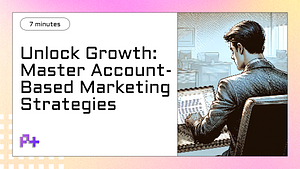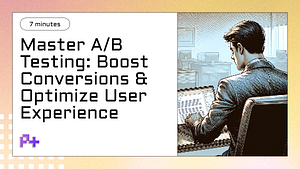Summary
- What is AI and Its Role in Sales Prospecting?
- Use Cases of AI in Sales Prospecting: Transforming the Process
- Which tools to use for prospecting with AI?
- Best Practices for Implementing AI Tools in Your Sales Strategy
- Future Trends: The Evolution of AI in Sales Prospecting
- Real-World Examples: Success Stories of AI in Sales Prospecting
What is AI and Its Role in Sales Prospecting?
Artificial Intelligence (AI) refers to the simulation of human intelligence processes by machines, particularly computer systems. In the context of sales prospecting, AI plays a pivotal role by enhancing the efficiency and effectiveness of identifying and engaging potential customers. By leveraging algorithms, machine learning, and data analytics, AI can analyze vast amounts of data to pinpoint leads that are most likely to convert. This technology enables sales teams to focus their efforts on high-quality prospects, ultimately streamlining the sales process.
Incorporating AI into sales prospecting can significantly improve the accuracy of target audience segmentation. Traditional methods of prospecting often rely on guesswork or historical data, which can be time-consuming and lead to missed opportunities. However, AI-driven tools can assess patterns in customer behavior, preferences, and demographics to create detailed profiles of ideal customers. This data-driven approach not only saves time but also increases the chances of successful engagement by ensuring that sales efforts are directed toward the right individuals at the right time.
Moreover, AI prospecting tools can automate various aspects of the outreach process. From sending personalized emails to scheduling follow-ups, AI can handle repetitive tasks that would otherwise consume valuable time for sales representatives. This automation allows sales teams to focus on building relationships and closing deals rather than getting bogged down by administrative duties. As a result, organizations can boost their overall productivity and increase conversion rates, making AI an indispensable asset in modern sales prospecting strategies.
Use Cases of AI in Sales Prospecting: Transforming the Process
AI prospecting is revolutionizing the way sales teams identify and engage potential customers. By leveraging artificial intelligence, businesses can streamline their prospecting efforts, making them more efficient and effective. One significant use case of AI in sales prospecting is lead scoring. AI algorithms analyze historical data to identify patterns and characteristics that correlate with successful conversions. This allows sales teams to prioritize leads who are more likely to convert, ensuring that their time and resources are focused on the most promising opportunities.
Another impactful application of AI in sales prospecting is the automation of outreach efforts. Tools powered by AI can personalize email campaigns, schedule follow-ups, and even optimize messaging based on the recipient's behavior. By analyzing data such as previous interactions and engagement levels, AI can tailor communication strategies that resonate with individual prospects. This level of personalization not only increases the chances of capturing the prospect's attention but also nurtures relationships effectively, leading to higher conversion rates.
Furthermore, AI in prospecting enhances market research capabilities. Through advanced data analytics, AI tools can sift through vast amounts of data to identify emerging trends, competitive landscapes, and customer preferences. This information equips sales teams with valuable insights, allowing them to adapt their strategies and target the right audiences with precision. By utilizing AI for market research, businesses can not only refine their prospecting efforts but also position themselves advantageously within their industry, ultimately driving growth and success.
Which tools to use for prospecting with AI?
Aisdr.com is an innovative platform designed to enhance the prospecting process through the power of artificial intelligence. By utilizing advanced algorithms and data analytics, Aisdr streamlines the identification and qualification of potential leads, making it easier for sales teams to connect with the right prospects. The platform offers features such as automated lead generation, tailored outreach suggestions, and insightful analytics, enabling businesses to optimize their sales strategies and increase conversion rates. With Aisdr.com, companies can leverage AI to save time, reduce manual effort, and ultimately drive more successful sales outcomes.
Apollo.io is an innovative platform designed to enhance prospecting efforts through the power of artificial intelligence. By leveraging advanced algorithms and extensive databases, APollo.io provides users with valuable insights into potential leads, helping sales teams identify and engage with the right prospects more effectively. The platform streamlines the process of gathering essential information, such as contact details and company profiles, allowing users to tailor their outreach strategies. With APollo.io, businesses can optimize their prospecting efforts, increase conversion rates, and ultimately drive growth through data-driven decision-making.
Best Practices for Implementing AI Tools in Your Sales Strategy
Implementing AI tools in your sales strategy can significantly enhance your prospecting efforts, leading to more efficient lead generation and improved conversion rates. To maximize the benefits of AI prospecting, businesses should start by clearly defining their goals. Understanding what you want to achieve—whether it’s increasing the quantity of leads, improving lead quality, or shortening the sales cycle—will help you choose the right AI tools tailored to your specific needs. For instance, if your goal is to enhance lead quality, consider AI solutions that offer advanced data analytics to identify high-potential prospects based on their behavior and engagement patterns.
Another best practice is to integrate AI prospecting tools seamlessly into your existing sales processes. This means ensuring that your sales team is adequately trained on how to utilize these tools effectively. For example, if you implement an AI-driven CRM system, provide your team with workshops and resources to understand how to interpret the insights generated by the AI. Additionally, ensure that these tools complement human efforts rather than replace them. AI can automate repetitive tasks such as data entry and initial outreach, allowing your sales team to focus on building relationships and closing deals. This collaborative approach not only enhances productivity but also fosters a more engaged and motivated sales force.
Finally, continuously monitor and refine your AI implementations. Sales strategies should be dynamic, adapting to changing market conditions and customer behaviors. Regularly reviewing the performance of your AI tools will help you identify what’s working and what needs adjustment. Utilize A/B testing for different approaches in your outreach campaigns to determine the most effective strategies. By analyzing the data collected from your AI tools, you can make informed decisions about how to tweak your sales tactics for optimal results. In summary, by setting clear objectives, integrating tools thoughtfully, and consistently evaluating their performance, you can effectively leverage AI prospecting to drive your sales success.
Future Trends: The Evolution of AI in Sales Prospecting
As we look towards the future, the evolution of AI in sales prospecting is set to transform the way businesses identify and engage potential customers. One of the most significant trends is the increasing integration of machine learning algorithms that analyze vast amounts of data to provide actionable insights. These algorithms can predict customer behavior, identify patterns in buying trends, and recommend the most effective outreach strategies. By harnessing these capabilities, sales teams can refine their targeting efforts, ensuring that they connect with prospects who are more likely to convert, thereby increasing overall sales efficiency.
Another notable trend is the rise of conversational AI technologies, such as chatbots and voice assistants, which enhance the prospecting process. These tools allow businesses to engage with potential customers in real time, answering questions and nurturing leads even outside of traditional office hours. The integration of natural language processing (NLP) enables these AI systems to understand and respond to inquiries in a human-like manner, making interactions feel more personalized and effective. As these technologies continue to advance, they will empower organizations to maintain a continuous dialogue with prospects, leading to stronger relationships and improved conversion rates.
Finally, the future of AI in sales prospecting will see an emphasis on ethical AI practices and data privacy. As businesses increasingly rely on AI tools, it is crucial to ensure that the data used is collected and handled responsibly. Transparency in how AI algorithms function and how customer data is utilized will become a priority. Companies that prioritize ethical AI practices will not only build trust with their prospects but also differentiate themselves in a competitive marketplace. By focusing on these future trends, businesses can leverage AI prospecting to create more meaningful connections and drive sustainable growth.
Real-World Examples: Success Stories of AI in Sales Prospecting
AI prospecting has emerged as a game-changer for organizations looking to streamline their outreach and enhance their conversion rates. One notable success story comes from a leading software company that implemented AI-driven tools to analyze customer behavior and demographics. By integrating an AI prospecting solution, the company was able to identify high-potential leads more effectively, resulting in a 30% increase in their lead conversion rate within just six months. This innovative approach allowed sales teams to focus their efforts on the most promising prospects, ultimately boosting overall sales performance and revenue.
Another compelling example is a well-known financial services firm that harnessed AI to automate its prospecting process. By utilizing machine learning algorithms to sift through vast datasets, the firm identified patterns and trends that human analysts might overlook. This AI prospecting strategy enabled the company to create highly targeted marketing campaigns tailored to the specific needs of different customer segments. As a result, the firm experienced a significant reduction in customer acquisition costs, coupled with a 50% increase in engagement rates. This success illustrates how leveraging AI can not only enhance efficiency but also foster deeper connections with potential clients.
Lastly, a global e-commerce retailer adopted AI prospecting tools to enhance its lead nurturing efforts. By analyzing customer interactions and behaviors in real-time, the retailer was able to personalize its outreach, sending tailored recommendations to potential buyers at optimal times. This strategy led to a remarkable 40% increase in sales from previously cold leads, showcasing the effectiveness of AI in identifying and engaging prospects. The success stories of these companies highlight the transformative power of AI prospecting, demonstrating how it can lead to increased efficiency, lower costs, and ultimately, substantial growth in sales.



